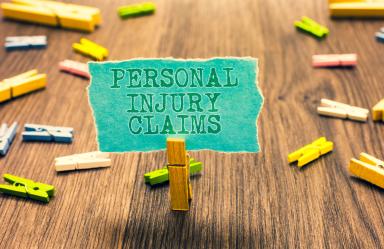Kentucky Personal Injury Laws

Injuries due to negligence, recklessness, or misconduct by another person can occur at any time. These injuries can range from slip-and-fall accidents to workplace injuries and medical malpractice. As such, it is important that a person be aware of their right to seek compensation for the physical, emotional, or financial harm resulting from such incidents, especially when they are in America’s Bluegrass State.
A study by the Kentucky Injury Prevention and Research Center found that there were close to 380,000 injury-related ER visits among Kentucky residents in 2020. Of these incidents, around 120,000 were slip-and-falls, while 42,080 were due to motor vehicle crashes. The Bureau of Labor Statistics’ 2019 Survey of Occupational Injuries and Illnesses also revealed that over 38,000 nonfatal workplace injuries and illnesses were reported in Kentucky during that year.
Whether you live in Kentucky or are just passing by, the risk of injury will always be present. Thus, it is essential that you not only consult with legal professionals but also understand your rights and remedies under Kentucky’s personal injury laws. Read on to learn about the common personal injury cases that occur in the state and how victims can seek proper relief and compensation.
Motor Vehicle Accident Laws in Kentucky
Vehicular incidents can happen in any state, and Kentucky is no exception to this. According to a government report on personal injury cases in the state, 366 claims related to automobile incidents were filed in June 2021, compared to 410 cases in the same month of 2022. A vehicle collision report from the state’s transportation department also revealed a 4.1% increase in fatal collisions across the state from 2019 to 2020, usually with other moving vehicles.
When you’re driving around in Kentucky, there is no doubt that you are also facing the risk of getting into a motor vehicle accident. Here are some things you need to know about the state’s motor vehicle laws and how you can use them to protect your rights.
Personal Injury Protection Coverage
Kentucky’s Motor Vehicle Reparations Act requires all motor vehicles in the state to have PIP coverage. An exception to this is motorcycles, as the basic PIP coverage is optional for them.
Because Kentucky is a no-fault state for car insurance claims, it does not require motor vehicle accident victims to prove negligence in order to receive PIP benefits.
PIP offers up to $10,000 per person per accident for injury costs. An injured person can file their PIP claim with the insurer of the vehicle they were occupying at the time of the accident or with the offending party’s insurer if they were a pedestrian.
If the vehicle is not insured, then the victim can file a claim for PIP benefits with their own policy or with a household member’s policy. If these remedies are not available, the injured person can seek benefits through the Kentucky Assigned Claims Plan. Vehicle owners who have no insurance are not eligible for any basic PIP benefits.
PIP is applied to medical damages, lost wages, or out-of-pocket expenses arising from vehicular incidents. However, this coverage has its limits. Individuals who have PIP are presumed to have accepted the limitation on their right to sue for damages.
A victim may sue for damages only if they suffered grievous injuries or significant financial loss. The following requirements must be met in a suit for damages:
A person’s injuries must exceed $1,000 in medical expenses.
The injury involves a broken bone, permanent disfigurement or injury, or death.
The victim must reject in writing the limitation on one’s right to seek damages.
The written rejection must be filed with the Department of Insurance.
Motor Vehicle Insurance Requirements
If the damages arising from a car accident go beyond the PIP coverage limit, Kentucky law provides another way for victims to be compensated for their losses. They may file a third-party claim against the at-fault driver’s liability insurance policy.
The state government requires motor vehicle owners across Kentucky to have an auto insurance policy that will cover costs arising from personal injury and property damage in vehicular accidents. Vehicle owners must have the following coverage and minimum limits:
$25,000 for all damages arising from bodily injury sustained by one person.
$50,000 for all damages arising from bodily injury sustained by each person injured in a single accident.
$25,000 for all damages arising from damage or destruction of property.
A vehicle owner may also acquire at least $60,000 in single-limit liability coverage for damages due to bodily injury and property damage.
Medical Malpractice Laws in Kentucky
Medical malpractice happens when a healthcare professional negligently performs their duties to the point that a patient is harmed or injured as a result of their actions. Because of this, injured parties can pursue legal action against healthcare providers for compensation and accountability. As medical malpractice is one of the most intricate types of personal injury claims in Kentucky, claimants must satisfy multiple legal requirements.
When a person files a medical malpractice case in Kentucky, they must submit a certificate of merit along with their complaint. The certificate will serve as proof that the claimant has consulted with an expert who believes that there is a reasonable basis for the complaint and is qualified under the state’s laws to provide expert testimony on whether there was medical malpractice.
If the complainant has, in good faith, made three attempts to consult with experts but has not been provided consultation, they must state so in an affidavit. The certificate requirement is waived for claims where expert testimony is not needed.
If the healthcare provider has not given the complainant’s medical records after their request for such, then the law gives the victim an extra 90-day window to submit the certificate. This is to give the complainant enough time to review the delayed medical records and consult with experts before filing a legal claim for damages.
Product Liability Laws in Kentucky
Product liability is all about ensuring that what consumers buy is safe and dependable. To protect its residents, the Bluegrass State has provided safety nets through legislation so that manufacturers are accountable for the products they create.
Kentucky law first establishes presumptions with regard to product liability cases. First, if the injury occurs more than five years after it was bought or eight years after it was made, then it is presumed that the product isn’t faulty. Second, a product isn’t considered defective if it was made following the standard practices or state-of-the-art methods that were accepted when it was designed and produced. These presumptions, while making it difficult for an injured party to win a suit, can be extinguished through strong evidence to the contrary.
If someone gets hurt or has their property damaged because of a product, Kentucky law states that the manufacturer of the product will only be held liable if the defective product was used by the injured party in exactly the same way it was when it left the production facility and did not have any changes or modifications. The manufacturer will not be held responsible for personal injuries if the injured party altered the product in a way that caused the damage in the first place. Neither will they be held accountable if the injured party was neglectful when they used the product, and such neglect led to the injury.
However, wholesalers, distributors, or retailers can be held liable for damages in certain product liability cases. If the manufacturer is identified and taken to court, then the broker must prove that the product was sold in the same condition as when they received it from the manufacturer. Failure to do so would mean that they could also be held liable for the injury.
Likewise, if the middlemen breached an express warranty or were aware of the defects of the product yet still sold it to an interested party, they may be held liable under the law.
Premises Liability Laws in Kentucky
Kentucky personal injury lawsuits may also arise from the negligence of a property owner to ensure the safety of their visitors. Property owners have a legal obligation to employ reasonable precautions to prevent accidents or injuries on their property. This includes correcting dangers such as slippery flooring, uneven paths, electrical malfunctions, and other dangerous circumstances that could harm visitors. When property owners fail to meet this duty of care and accidents occur as a result, the injured party may file a premises liability case to seek compensation for damages.
To establish negligence, the injured party must prove the following:
The defendant had a legal obligation or duty toward the complainant.
The defendant failed to fulfill that obligation or duty.
The complainant suffered harm.
The defendant’s actions directly contributed to the harm suffered by the complainant.
The defendant’s actions were a direct cause of the harm experienced by the complainant.
Kentucky law states that the owner of a property or real estate is generally not responsible for the injuries suffered by trespassers on their property. However, an exception is made if the injuries sustained by the trespassers were intentionally caused by the owner or their agent. The burden of proving negligence on the part of the property owner then falls on the injured party.
Worker’s Compensation Laws in Kentucky
Workplace injuries can pose significant challenges for employers and employees. In Kentucky, workers’ compensation laws play a crucial role in providing protection for workers who suffer from injuries or illnesses while on the job.
Kentucky’s Workers’ Compensation Act, which covers nearly all employees, states that persons who are injured in the workplace have the right to choose their medical providers even if the employer offers a managed healthcare system. Employers are also required by law to pay for the relief and treatment of the injured employee at the time of the injury or as is required for the cure and treatment of the injury.
For workplace injuries or occupational diseases that give rise to permanent total disability, the injured party is awarded benefits that have no set limit and will be active for as long as they remain disabled. For permanent partial disability, the benefits that the injured party will receive will continue for 780 weeks from the date of the injury. This limit can be extended, subject to the following rules:
The employee must file an application for the continuation of benefits within 75 days of the 780-week period.
The employee must demonstrate that further medical treatment remains reasonably necessary and is related to the workplace injury.
An administrative law judge must review the care to determine that the continued benefits are necessary.
In cases where the employee can file an application for the continuation of benefits, the employer will be held responsible for providing the benefits needed by the injured party.
Kentucky Business Liability Insurance Requirements
Like many other states, Kentucky imposes a requirement for businesses to acquire specific types of insurance to protect their interests and the public from unexpected events.
Employers or business owners must register with the Office of Employment and Training (OET) for their state unemployment insurance discount to comply with unemployment insurance requirements.
Employers or business owners are also required to provide workers’ compensation insurance coverage.
Liability insurance for personal injuries and property damage is also invaluable for businesses that interact with their stakeholders, as it acts as a shield from financial repercussions that may occur on their premises or operations.
Kentucky does not administer a state-run insurance program. It is up to the employer or business owner to secure insurance from a private insurance carrier.
How Much Can Someone Sue for an Injury in Kentucky?
Kentucky has no fixed formula for quantifying damages in personal injury lawsuits. The compensation for damages is based on the evidence and circumstances presented by the parties in court. Injured parties also do not face restrictions from the state in regard to the amount of compensation they can seek.
For damages arising from motor vehicle accidents, the state’s no-fault system limits the individual’s tort rights. This is due to the PIP coverage, which prevents individuals from suing and being sued for damages, except in certain cases provided by law.
Kentucky’s courts also follow the “pure comparative negligence” rule. If there are multiple parties in an accident, fault is divided among them according to the degree of their involvement in the accident. If you’re 99% at fault, you can still recover damages for the 1% for which another party was responsible.
Factors such as the level of recklessness and negligence each driver exhibited during the incident will be analyzed by the court based on the evidence provided by the parties in order to determine the amount of damages to be awarded. For example, if the court finds that one of the parties broke a law and the breach resulted in the injury, then the court will assign to them the greater responsibility for rectifying the damages.
The Statute of Limitations in Kentucky
Under Kentucky law, a lawsuit must be brought to court within one year from when the cause of legal action arose:
Injury to the person of the plaintiff, or of her husband, his wife, child, ward, apprentice, or servant. If the injured person is a minor, the one-year limit will not run until the child has reached the age of majority, which is 18 years old.
Injury to persons, cattle, or other livestock by railroads or other corporations, with the exception of hospitals.
Injury due to malpractice or negligence by a medical practitioner or a hospital. In this case, the statute of limitations starts once the injury is discovered or should have been reasonably discovered.
For injuries caused by motor vehicle accidents, a case must be filed within two years from when the victim became aware of the injury or four years from the date of the accident (whichever comes earlier), provided they have not received compensation for the injuries and can establish that the accident was the cause of their injuries.
A victim can also claim additional compensation for a motor vehicle injury within two years after the last payment for damages if they believe that they should be receiving more than their PIP coverage. There is a 60-day window to commence action against the at-fault driver’s insurance company if the insurance claim is barred due to coverage disputes.
Legal Resources for Injured Folks in Kentucky
Seeking legal aid is a much-needed step in ensuring that a person can receive the justice and compensation that they deserve after suffering from harm caused by another’s negligence or wrongdoing. It not only provides a lifeline for victims to navigate Kentucky’s complex legal system while protecting their rights but also helps level the playing field when it comes to gathering crucial evidence and negotiating with private insurance companies.
Here are some legal resources injured persons in Kentucky can reach out to for legal aid.
Kentucky Access to Justice Commission
The Kentucky Access to Justice Commission is a government-established organization that has been working since 2010 to achieve its primary goal of supporting people of low to moderate income and promoting equitable access to the state’s judicial system.
The organization mainly assists those who are embroiled in matters related to civil law by creating and implementing initiatives aimed at removing impediments to equitable court justice. They also use government grants to provide opportunities for private bar members to render pro bono representation.
The Kentucky Access to Justice Commission aspires to increase awareness of the positive impact of issue resolution through the judicial system and legal aid programs available throughout local and state communities.
Kentucky Legal Aid
Since its establishment in 1977, Kentucky Legal Aid has provided free civil law services in the southwest of the state, specializing in giving legal assistance to the low-income, the disabled, and the elderly. This nonprofit organization has made it its mission to ensure that all of the state’s residents have access to legal representation and resources regardless of their financial circumstances.
Kentucky Legal Aid focuses on civil legal matters such as housing, family law, consumer rights, and personal injury cases. With its team of experienced attorneys who work to empower disadvantaged communities, the organization plays a vital role in promoting fairness and equality in Kentucky’s legal system.
The Kentucky Injury Prevention and Research Center
The KIPRC, which was established in 1994 after a partnership between the state government through the Kentucky Department for Public Health and the University of Kentucky College of Public Health, has been working to increase safety awareness and mitigate injuries statewide.
The organization has a two-pronged approach toward fulfilling its goal of state-wide injury prevention: to research local and state injury causes and the means and methods to prevent them by using government-provided data, and to implement community surveillance and educational programs that use research to mitigate personal injuries.
Expertise.com StaffAuthor
Step into the world of Expertise.com, your go-to hub for credible insights. We don't take accuracy lightly around here. Our squad of expert reviewers, each a maestro in their field, has given the green light to every single article you'll find. From rigorous fact-checking to meticulous evaluations of service providers, we've got it all covered. So feel free to dive in and explore. The information you'll uncover has been stamped with the seal of approval by our top-notch experts.




